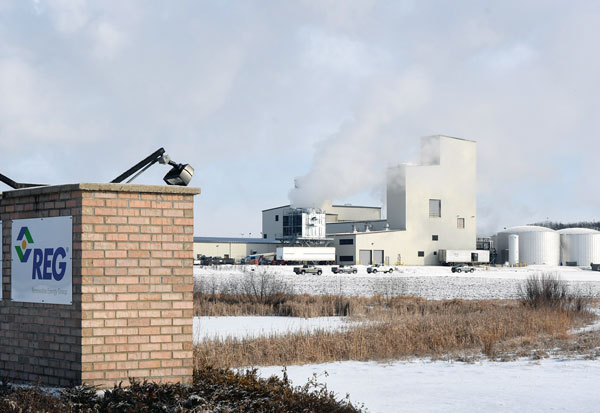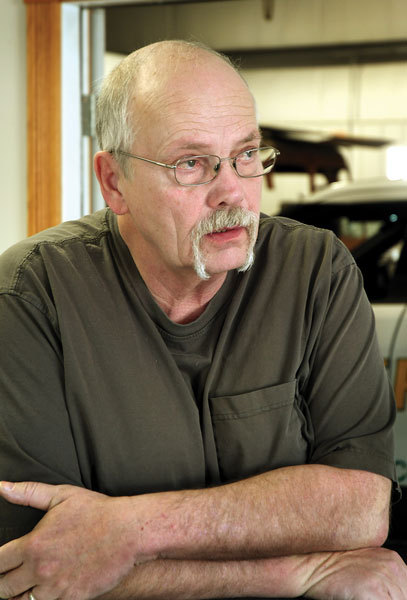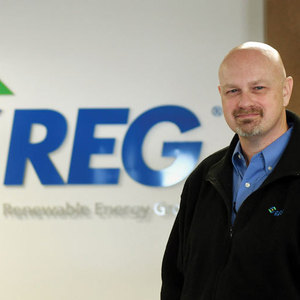The Faces Behind the Statistics





PHOTO: MINNESOTA SOYBEAN GROWERS ASSOCIATION
May 16, 2018
BY Tom Slunecka
Bruce Springsteen recorded the song “My Hometown” in 1983 and, although the words describe scenes from his childhood in Freehold, New Jersey, the sentiment—vacant stores on Main Street, plant closures, and the loss of jobs—resonates with many who grew up in rural communities across the country. A sole employer, possibly a manufacturing plant, loses market share to overseas competition and shutters its doors. There’s a ripple effect both immediate and delayed: laid-off workers seek employment farther away in larger metropolitan areas, local businesses suffer as the population shift becomes permanent, a longtime high school is absorbed into a larger education system in a neighboring county. Some towns bounce back. Some never recover.
Biodiesel Fills the Gap
Albert Lea, Minnesota, has seen good times and tough times. A meat packing plant shut down in 1990, putting 1,200 people out of work. In 2001, a devastating fire at the Farmland Foods meat processing plant left the city without its second largest employer.
“We’ve seen ups and downs in this community,” says Josh Quinlivan of Albert Lea Electric. “Our economy in this region is based on farming. If farming is not doing good, we’re not doing good.”
In 2002, Minnesota became the first state in the nation to require that all diesel fuel sold contain at least a 2 percent blend (B2) of biodiesel. Some hailed it as a much-needed lifeline to the agriculture community, and towns such as Albert Lea.
Not so fast. Painstaking work remained as it would be another three years before implementation. The state’s biodiesel industry had to grow just to meet the requirements of the B2 mandate.
In 2005, Renewable Energy Group Inc. constructed a facility for SoyMor Biodiesel LLC in Albert Lea. Six years later, REG acquired the plant and spent $21 million in upgrades, supporting nearly 80 construction jobs in the process.
And as the saying goes, the future was now. Minnesota was becoming a trailblazer in the production and use of biodiesel. In 2014, another “first” was in the books as the state moved to require 10 percent biodiesel, or B10, in diesel blends sold during the summer months. B10 was required from April 1 to Sept. 30 and B5 is required during the remaining winter months. Beginning this May, however, the summer blend increased to B20.
And the impact of REG Albert Lea on the surrounding community? In 2016, the plant supported 33 direct jobs, produced 38 million gallons of biodiesel, and purchased 182 million pounds of feedstock from Minnesota vendors, resulting in $51 million of added value to the state’s economy.
Impressive, indeed, but numbers don’t necessarily tell the whole story. In the words of journalist Campbell Brown, “Human faces shouldn’t get lost amid the statistics.”
More Than Just a Job
John Priefer was born and raised in Cleveland, Ohio. He witnessed the struggles of manufacturing in the Rust Belt, working in the fastener industry and watching jobs move offshore. Prior to his move to Northwood, Iowa, not far from Albert Lea, Priefer ran a valve and pump rebuilding company in Cleveland. A maintenance supervisor for seven years now at REG Albert Lea, he believes the plant has been a real plus for the area. “It’s a pleasant change,” Priefer says. “Instead of watching something decline, you’re watching something progress.”
After a 12-hour shift at the REG plant, he counts his blessings, loves small town living, and is grateful his talents are in high demand. “It’s a nice surprise that those skills are still valuable in an agricultural area,” Priefer says.
Southern Minnesota has always been home to Jeremy Larsen, operations supervisor at REG Albert Lea, but after high school he moved to Colorado Springs, Colorado, with the rest of his family. In 2012, he relocated to Glenville, Minnesota, a town of about 600 people just a short distance from the REG facility. He began as a night operator and now manages 17 employees.
Larsen and his wife are plugged into the Glenville community and he’s proud of the fact that he knows pretty much everyone in town. “It means a lot to me,” Larsen says. “But it’s more important for my kids. I can share childhood memories with them in an area I grew up. And growing up in an agriculture community, it’s awesome being able to help support local farmers.”
Bryan Christjansen is the general manager for three of REG’s facilities in Albert Lea, Minnesota; Mason City, Iowa; and Okeechobee, Florida. A veteran of the renewable fuels industry, he believes biodiesel is a strong product.
“We’re taking people’s waste streams and producing a product,” Christjansen says. “That in itself is a much better sell for renewable energy.”
He takes a great deal of pride in REG Albert Lea’s economic impact on the surrounding community. “We’re providing good-paying jobs and good benefits to this community,” he says. “A lot of the younger generation that’s coming through now finds that this is a very good place to work, and a safe working environment.”
Fueling Communities
“We’re all working together; that’s the secret.” The words of the late Walmart founder Sam Walton ring true in the communities surrounding REG Albert Lea.
Born and raised in Albert Lea, Josh Quinlivan attended college in Minnesota’s Twin Cities of Minneapolis and Saint Paul but returned 14 years ago and joined Albert Lea Electric, an electrical contractor in commercial and residential, as well as farms. He says the REG plant is one of Albert Lea Electric’s top customers.
“We’ve done a lot of their Datacom wiring, fiber-optic stuff, maintenance and troubleshooting,” Quinlivan says. “Anytime you have a successful company that seems like it’s sustainable, and we have a great relationship with them, that’s obviously good for us.”
Down the road in Glenville, Wes Webb runs Com-Tech, which provides on-site communications equipment to REG Albert Lea. Webb has lived in the community for 57 years and serves as the mayor of Glenville.
Of the biodiesel plant, Webb says, “It’s nice to have them here. It’s a good asset. There’s employment. They purchase locally. They’re a good community partner. Every employer you have contributes to the overall well-being of the area. And to have an employer such as REG that pays good wages and that has good jobs is important.”
Knutson Oil Co. is located about a block-and-a-half away from the community center in Glenville. The business was started by Bob Knutson’s father in 1951. Bob joined the business in 1975, followed by his brother Larry a few years later.
REG Albert Lea and Mason City contracted Knutson several years ago to haul wastewater from the plants. “We probably hired another three to four guys,” Knutson says, adding that the company bought three additional semis and a couple trailers, all locally. “There again you get that trickle down,” Knutson says. “We haul the wastewater over to Riceville, Iowa, where they take the methane gas off it and make electricity to put back on the grid. We’ve got six trailers total to haul this wastewater, and now all of a sudden, between what we were doing for REG, we have other customers that want our services.”
Knutson says the new hires are local, and it’s had a positive impact on the community. “It’s grown to be a big part of our business,” he says. “I’m kind of proud of what we’ve done, especially in a small community.”
More Than Statistics
According to the Minnesota Department of Agriculture, the total economic impact of the biodiesel industry in the state is estimated at $1.7 billion, with the total employment impact estimated at nearly 5,400 jobs.
In this day and age of Twitter and social media as a whole, statistics seem to have lost a great deal of impact as they are bandied about in an atmosphere of dueling keystrokes. But we can’t blame technology or the younger generation.
Almost 25 years ago, I can recall the Wendy’s commercial when Clara Peller hollered, “Where’s the beef?” A catchy phrase was then hijacked by political campaigns and remains to this day a term to question an idea or claim.
Maybe our society has become so divided that we’ve been relegated to “seeing is believing.” In southern Minnesota, folks are seeing the impact of biodiesel beyond just statistics. In these communities, Main Street is back.
Author: Tom Slunecka
CEO, Minnesota Soybean Growers Association
507-388-1635
tom@mnsoybean.com
Advertisement
Advertisement
Advertisement
Advertisement
Related Stories
The U.S. Energy Information Administration maintained its forecast for 2025 and 2026 biodiesel, renewable diesel and sustainable aviation fuel (SAF) production in its latest Short-Term Energy Outlook, released July 8.
XCF Global Inc. on July 10 shared its strategic plan to invest close to $1 billion in developing a network of SAF production facilities, expanding its U.S. footprint, and advancing its international growth strategy.
U.S. fuel ethanol capacity fell slightly in April, while biodiesel and renewable diesel capacity held steady, according to data released by the U.S. EIA on June 30. Feedstock consumption was down when compared to the previous month.
XCF Global Inc. on July 8 provided a production update on its flagship New Rise Reno facility, underscoring that the plant has successfully produced SAF, renewable diesel, and renewable naphtha during its initial ramp-up.
The USDA’s Risk Management Agency is implementing multiple changes to the Camelina pilot insurance program for the 2026 and succeeding crop years. The changes will expand coverage options and provide greater flexibility for producers.
Upcoming Events










